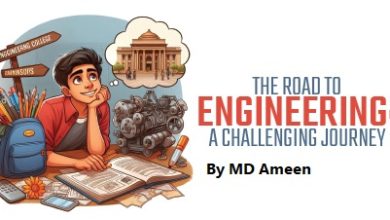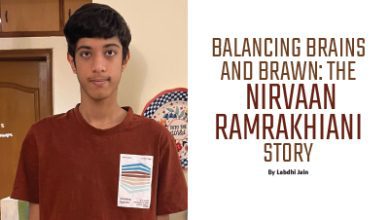The Relevance of Bhagvad Gita in the World of Modern Governance

Our ancient wisdom literature are the Vedas, Vedanta, Upanishads, Ramayana, Mahabharata, Bhagavad Gita, Arthashastra and many more …. They are a storehouse of comprehensive and powerful philosophy to be applied in all ages for the benefit of mankind and contributing to modern life at both personal and professional level. Holy Gita which has 18 Chapters 700 Verses / Slokas is considered as the best guide for self development. It is the summary of all Vedic philosophies and its teachings can be effectively applied to address many problems related to individual or Organization. It has got all the management tactics to achieve the mental equilibrium and to overcome any crisis situation and therefore helping in effective governance.

Before the battle of Kurukshetra began, both Arjuna and Duryodhana sought help from Lord Krishna, who obliged both the parties. Duryodhana chose the huge army of Sri Krishna while Arjuna felt happy to win his lord as his charioteer on whose able leadership began the great battle of Kurukshetra. Duryodhana failed to realize the role of a charioteer, but the world of governance believes that the charioteer is the captain who steers the ship amidst a tornado or a tempest to reach the harbour safely.
The philosophy of Bhagavad-Gita has remained and will remain as a guide for developing managerial effectiveness, not only in this 21st century but also for many centuries more to come. The management lessons from ‘Mahabharata’ extensively deals with governance of kingdom and can be applied for business houses too.
Glimpses of most famous verse in Mahabharat are explained hereunder :
“कर्मण्येवाधिकारस्ते मा फलेषु कदाचन।
मा कर्मफलहेतुर्भूर्मा ते सङ्गोऽस्त्वकर्मणि॥“
The meaning of the verse is—
You have the right to work only but never to its fruits.
Let not the fruits of action be your motive, nor let your attachment be to inaction.
When Arjuna was not willing to fight the Epic war of Mahabharat and Krishna explains to him to perform his duties. In this case Krishna tells Arjun that no matter what is the result of the war, he should not be worried about it. His duty is to fight, then he has to fight. He wins or loses that is not important. Even if he dies during the war, he will attain heaven because he has correctly performed his duty. Do not let the fruit be the purpose of your actions, and therefore you won’t be attached to not doing your duty.
And then Lord Krishna subsequently said: –
“दूरेण ह्यवरं कर्म बुद्धियोगाद्धनञ्जय।
बुद्धौ शरणमन्विच्छ कृपणाः फलहेतवः
In this shloka, Shri Krishna expresses his views
“We shouldn’t work for results but rather work with an ideal (BuddhiYoga) or a vision because if we work for result, then our work will culminate once we achieve the result. However, when we work with an ideal or vision and keep it so high, we keep on striving to reach it so that in the process of delivering our Karma we grow. Hence, work for results is far inferior to work with an ideal, a vision.”
In the context of Governance and modern management it means that every manager should be focused on his work and at the same time be “in-sync” with the organization’s vision and then it ultimately leads to excellence. Clearly, the concept of Management by Objectives is consistent with the teachings of Bhagavad Gita and ancient Indian wisdoms. People should be able to trust upon the existing corporate governance in the organization. Our managers are the modern charioteers who lead their organisations and of course the nation in different fields: educational, agricultural, industrial, political or social.
तस्मादसक्तः सततं कार्यं कर्म समाचर ।
असक्तो ह्याचरन्कर्म परमाप्नोति पुरुषः ॥
Its states that you must always fulfill all your obligatory duties without attachment. By performing actions without attachment, one attains the Highest. A person who rejoices in the Self and performs action simply as a [routine] business of organs of action, there is no difference between (his) action and non action. That is why he inflicts punishment on, or does favour to, every being, not with desire for any gain for himself, but with a conviction that it a is thing that deserves to be performed. Therefore, just unattached, one should perform action that is to be performed.
The mind is affected by these impressions. We react to the external world based on these impressions. We never see the truth which is covered by these impressions. The guidance given in Gita helps us to build a mental proof against the experiences in life and so the mind will not be affected by the experiences. If the mind is affected, then it loses the strength and it fails to understand the reality. Reality is more precious than the experiences. The Gita helps the mind to remain like a drop of water on the lotus leaf, which appears attached but in reality it’s not attached with that leaf .
Lord Krishna expresses this view through the shloka ;
यदा यदा हि धर्मस्य ग्लानिर्भवति भारत ।
अभ्युत्थानमधर्मस्य तदात्मानं सृजाम्यहम् ॥४–७॥
परित्राणाय साधूनां विनाशाय च दुष्कृताम् ।
धर्मसंस्थापनार्थाय सम्भवामि युगे युगे ॥

The English translation goes on to say “Whenever, O descendant of Bharata, there is decline of Dharma, and rise of Adharma, then I body Myself forth. For the protection of the good, for the destruction of the wicked, and for the establishment of Dharma I come into being in every age.”
The message of Lord Krishna we can accept is that of a leader who aims to lead his organization amidst despair or anarchy to the road of prosperity with a right approach, condemning the vices and upholding virtue to establish ‘Dharma’ or righteousness. In the modern world of governance, we thus die and are reborn again hoping to give ourselves and our next generation a blissful world by implementing our ancient Indian ethos.
The following principles of Indian Ethos may be useful for management practitioners to govern: –
- Human Beings should not follow the path of fulfilling the evil actions just for the sake of achieving the desires which is harmful. It is the right path, which will uphold the family, organisational and the social fabric. It helps in the long term upliftment of all living beings and ensures welfare of society
- Life is full of Challenges, accept it and perform at our best, Do not expect results. Always understand, it is fears and expectations that cause restrictions and limitations
- Actions should be performed keeping in view the welfare of the society as a whole. Thus, actions should be guided by enlightened collective interest and not by selfish interest or self – interest alone. In the context of corporate organisations, it implies that corporate behaviour should be guided by larger social interest. A business leader is a trustee and servant of organization and stakeholders and not the owner of assets.
- It is the optimum utilisation of resources efficiently and productively and the judicious use of resources and preserving the resources for future
- Beyond survival, business needs innovation constantly seeking more effective solutions to meet their economic and social expectations. Such innovations are required in processes, products, materials, machines, organisations, strategies , systems and people.
- Change and continuity will co-exist. So, there is a need to have to keep learning from the feedback loop from society and through internal processes of question, challenges
- Every human is unique and has Immense potential energy and talents for the perfection. Do not run away, it is cowardice, when in the thing you must do and be not afraid of anything, you will do marvelous work








